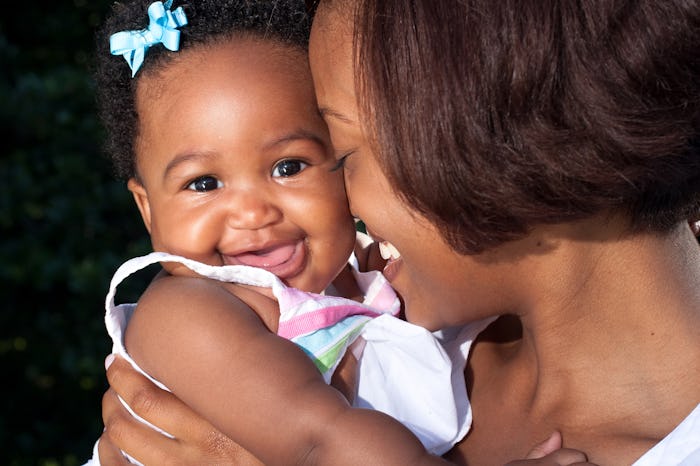Life
Do Millennial Parents Adopt More Than Older Generations?
When I was in my early twenties, I had thought about the possibility of adoption. At the time, I was unsure of my own fertility, and knew that hundreds of thousands of children were in the U.S. foster care system on any given day. Even though I gave birth to my son over two years ago, I still think about the possibility of adopting a second child. I do wonder, though, if that's more common among my generation. Do millennial parents adopt more than older generations? Turns out, not necessarily.
It's true that domestic adoptions have increased steadily between 1982 and 2007, before dipping in 2014, according to a report released this year by the National Council for Adoption. But the report doesn't break down the age of the adopting parents for each of the years cited, which means people from older generations could be adopting kids today.
In fact, according to AARP, more older adults age 50 and older are looking to adopt kids. On the flip side, most millennials are waiting to have kids, according to a 2016 Gallup analysis, which could mean people in their 20s today may represent a spike in adoptions 30 years from now.
Millennials, though, are adopting more cats, dogs, and other tiny creatures than older generations. According to Forbes, 35 percent of millennials are adopting pets today, compared with 32 percent of baby boomers. What's more: Forbes reported that 57 percent of millennial households have a dog, as opposed to 51 percent of all households in the United States.
Granted, those are just percentages. Millennials have surpassed baby boomers as the United States' largest generation, according to the Pew Research Center. There were more than 75 million millennials in 2015 (millennials, at the time, were defined as people within the 18-34 age range, with youngest born in 1997). Baby boomers, on the other hand, represented less than 75 million. The Pew Research Center also predicted that Gen X'ers — people 35 to 50 years old in 2015 — will overtake baby boomers in population by 2028.
So, on the surface, it may seem millennials are adopting more pets — and maybe even more children. But a look at the raw numbers would probably paint a more accurate picture.
Still, there's no denying that the millennial generation has changed parenting — from the way millennials parent to how and when they become parents.
Among the list of ways millennials have impacted parenting, two in particular stand out. One, unlike older generations, millennial parents are more likely to buck tradition. For example, according to Parent Co., 50 percent of millennial parents purposefully buy gender-neutral toys, versus 34 percent of older generations. And, according to the Atlantic, most millennials are having children outside the confines of marriage.
Two, millennials have changed what society knows about parenting styles. Again, according to Parent Co., millennial parents are more likely to be relaxed and responsive during child-rearing, whereas older generations took a helicopter parenting approach. Relative to this, millennials are also conscious of developing their child's sense of identity and independence.
These are just some of the ways millennial parents differ from baby boomers and Gen X'ers. But the truth is, of course millennials are different. That's the way generations work. Life progresses, things change, and people develop different views. Whether the succeeding generation will adopt kids — or pets — more or less than millennial parents won't be measured for a few decades. But you can at least count on this: They will be different, just like millennials differ from their baby boomer parents.
Watch Romper's new video series, Romper's Doula Diaries:
Check out the entire Romper's Doula Diaries series and other videos on Facebook and the Bustle app across Apple TV, Roku, and Amazon Fire TV.
